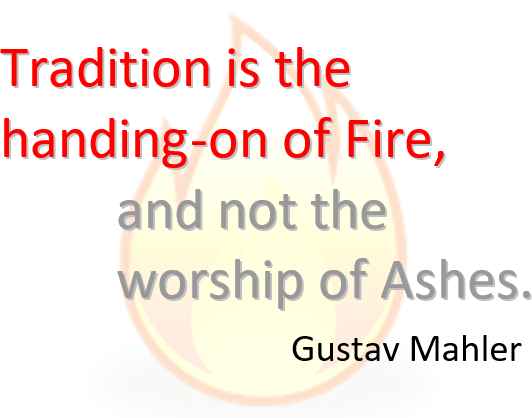Is tradition this saying (maybe not from Mahler, BTW):

Or this meme from Facebook?

Or this?
“The accumulated wisdom and experience of the past.” – Michael J. Pitts
The word is one which is used in in a variety of ways in different places and groups. There is some truth in all of the above three, but in my view none of them really get to the heart of the matter.
The issue is that “Tradition” is most often used as a noun, but must also be seen more as a verb. What I call “small-t traditions” are customs and practices that we have received from people in the past — perhaps the near past, perhaps antiquity, or something in between. They can be things we do, truths we believe, symbols we hold dear. For many, these things are of great importance, helping to provide a link to where we have come from and who we are.
I distinguish the small-t variety from “big-T Tradition,” which is, above all else, a process devoted to connecting us to our roots. By means of Tradition, we keep our group’s story alive. A biblical example may be found in I Corinthians 15:1-5:
Now I should remind you, brothers and sisters, of the good news that I proclaimed to you, which you in turn received, in which also you stand, through which also you are being saved, if you hold firmly to the message that I proclaimed to you—unless you have come to believe in vain. For I handed on to you as of first importance what I in turn had received: that Christ died for our sins in accordance with the scriptures, and that he was buried, and that he was raised on the third day in accordance with the scriptures, and that he appeared to Cephas, then to the twelve.
Paul is here describing a process and a message, which he describes “as of first importance.” He received this message and handed it on to his Corinthian converts, and it has been handed on to Christians through two millennia “as of first importance.” Here is the central story of the Christian faith, without which we become disconnected from our roots.
Christianity is not the only group to have a foundational story. Other faiths, nations, organizations, ethnic groups, families: all tend to look to where they have come from to know who they are and what their purpose in life may be. The process of Tradition aims to keep these threads unbroken, often giving rise to traditions (small-t) which help to tell the main story.
And here’s the problem: sometimes the small-t things end up being treated as big-T matters. To quote a friend of mine, “We end up majoring in the minors,” and can run the risk of diminishing the power of our root story. Michael Pitts is correct in his assessment of Tradition quoted above, which summarizes nicely the result of attending to the process of making sure that the Big Story is kept central. Lore from the past may be wisdom, but it may also be nonsense. Careful handing on the big truths helps us sort out the two.
The point of the Tradition process is not to enshrine the past, but to learn from it so that our future may be in continuity with the past in creative ways. I think that Pablo Picasso’s rather earthy definition points in this direction:
“Tradition is not wearing your grandfather’s hat; tradition is begetting a baby.”
Whatever group you may align yourself with (for me that’s the Christian faith in its Canadian Anglican manifestation), you may be assured that the group has a root story that needs to be remembered, taught to our children, and learned from to be used as a guide for the future.
Caveat #1:
Root stories are often written by the dominant people of history, and can obscure or even deny the stories of others. I was taught Canadian history from a settler/colonial point of view, which saw our indigenous peoples as proper subjects of displacement, assimilation, and cultural genocide. I believe I know better now, but I was the recipient of a historical tradition that denied much of its own truth. Just because our elders taught us in that way does not make it right.
One example from church history: Mary Magdalene is sometimes described as a former prostitute, but the biblical offers no support for this idea. Rather, it came from a misreading of various texts that became enshrined in our teaching. Today, we are able to see Mary as the first witness of the Resurrection, a leading member of the early church, and one whom Jesus loved.
Caveat #2:
Small-t traditions very easily acquire a life of their own, and must be treated with caution. Here’s a tongue-in-cheek view of how easily things become entrenched:
The Growth of (Church) Tradition
Year 1: “That was different for a change.”
Year 2: “That’s what we did last year.”
Year 3: “We’ve always done it that way.”
If we have a beloved tradition (or custom, the word I prefer), we need to ask ourselves from time to time whether it is still helping us to hand on the Story. Is it part of Tradition, or are we just doing it because “We’ve always done it that way?” If we’re doing the latter, we are indeed succumbing to peer pressure from dead people.
So let’s not wear our grandfather’s hat and call it tradition. Let’s continue to tell our stories so that the babies we beget will grow to know them in all their truth. Let’s hand on the fire!
